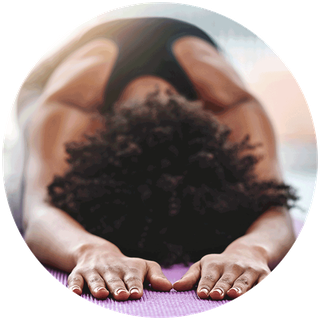Exercising in pregnancy
Gentle exercise during pregnancy is good (and safe) for you and your baby. Not only does it help you maintain a healthy weight but it also helps prepare your body for labour.
Find out how much you need, which types of exercise you can safely do and what to avoid.
How much exercise do I need?
Did you know that 150 minutes of exercise each week has loads of benefits for pregnant mums? It doesn't have to be in one go – even 10-minute spells can make a difference.
If you're used to doing regular exercise, keep it up! Just make sure to do what feels comfortable for your body and don't push yourself too much. Exercise does not have to be strenuous to be beneficial.
If you're not used to exercising, or have not done any for a while, now is a good time to begin.
Try starting off with 10 minutes of daily activity, like taking a brisk walk. You can then build up to 150 minutes of weekly exercise.
Remember: whatever your fitness level, it's really important to listen to your body and do what feels right for you.
As a general guideline, you should be able to hold a conversation while exercising. If you can't, you need to slow down.
Which types of exercise can I do?
Walking
This is a great form of exercise. Not only is it free but you can also easily incorporate it into your everyday life.
If you didn't exercise before, walking is a great way to get you started.
Swimming
Swimming is a really good form of exercise during pregnancy because the water helps support your increased weight.
Some local swimming pools provide specialist aqua-natal classes with qualified instructors.
Find your local swimming pool.
Running
Running during pregnancy is fine as long as you're experienced. If you're new to running, it's not a good idea to start now.
Prenatal yoga
This will help you relax and ease body tension with gentle stretching and breathing techniques.
Aerobics classes
Classes (including online ones) created for pregnant women feature low-impact exercises.
Pelvic floor and abdominal exercises
These types of exercise are really important in pregnancy, so try to fit them into your daily routine.
They have many benefits, including strengthening your muscles and joints.
You should however avoid exercises like sit-ups that involve lying on your back for longer than a few minutes (especially after 16 weeks).

Types of exercise to avoid
Lying on your back
Avoid exercise that involves lying on your back for longer than a few minutes (particularly after 16 weeks).
This is because the weight of your bump presses on the main blood vessel bringing blood back to your heart, which could cause low blood pressure and make you feel dizzy.
Exercise that risks your bump being hit
This includes sports like martial arts, football, rugby, tennis or squash.
It's also best to avoid activities that could lead to a fall or being thrown off-balance, such as horse riding, skiing or gymnastics.
Scuba diving
Scuba diving while pregnant is not considered safe, as your baby has no protection against decompression sickness and gas embolism (gas bubbles in the bloodstream).
Exercising at high altitude
Avoid exercising at high altitudes (2,500m or higher above sea level) until you have acclimatised, as you and your baby are at risk of altitude sickness.
Tips for exercising while pregnant
Here are some tips and advice for exercising during pregnancy:
- check out the article exercising in pregnancy on NHS.UK – make sure you warm up before and cool down afterwards
- avoid strenuous exercise in hot weather, as it's easier to overheat
- if you do exercise when it's hot outside, try to avoid the midday sun – go out in the early morning or late afternoon if possible, and remember a hat, sunblock and bottle of water
- hydration in general is important when exercising, so drink plenty of water and other fluids, whatever the weather
- listen to your body – stop if you feel uncomfortable, and talk to your doctor or midwife if you have any concerns
